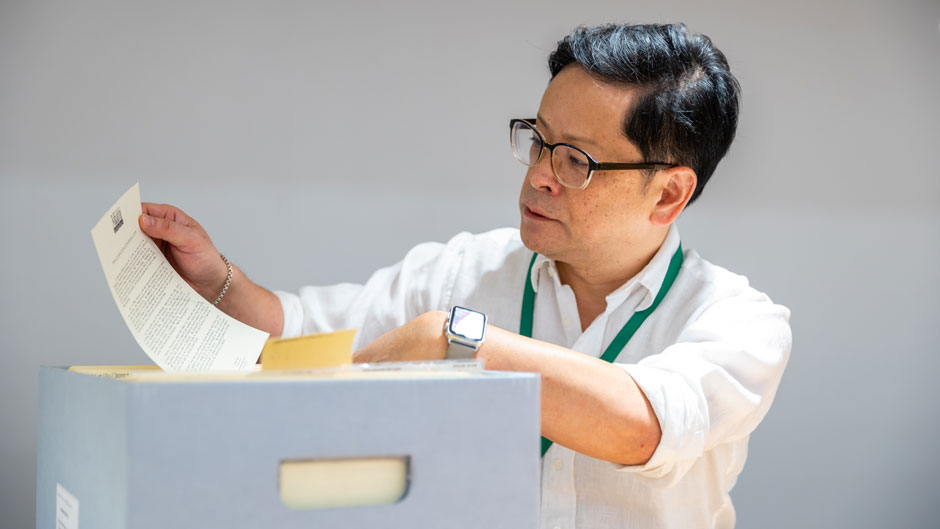Koichi Tasa, librarian associate professor and archivist for University of Miami Libraries, is focused on one major project these days.
As the University archivist he is responsible for documenting its institutional history, but if anyone came to him asking for the history of the University's LGBTQ community, he could show them very little. Almost nothing.
He wants to remedy that. Tasa, with the support of the Dean of Libraries Charles Eckman, has launched a search for all materials, memorabilia, articles, and testimonials that could become the University's LGBTQ archive. June is LGBTQ Pride Month.
“This is an important part of the University of Miami community who suffered and went through difficulties, but they contributed to the community,” said Tasa. “They should be celebrated.”
Tasa was inspired by a 2015 letter from UM President Julio Frenk where he mentioned the importance of “inclusivity” and celebrating the history of all marginalized groups on campus—gays, blacks, disabled, and others.
“When the book on the University of Miami’s history is written for the University’s centennial (in 2025), there should be one chapter on the LGBTQ (community’s) contributions,” said Tasa.
One of the first items to be included is among former UM President Henry King Stanford’s papers. It is a memo written to him by two gay students in 1975 asking for the University’s cooperation and protection since they wished to start a gay organization on campus.
On April 22, 1975, The Miami Hurricane student newspaper ran a short story announcing a meeting of the Gay Alliance, perhaps the first gay organization on campus, said Tasa. According to the article, 125 guests attended the meeting.
Such organizations on campus tended to operate underground and little documentation of their meetings are available. The '70s and '80s were years when being openly gay could be risky. Many students, faculty, and staff members chose to keep their sexual preferences private.
Jim Smart, executive director of UM Housing and Residential Life, was the first counselor of a student gay group called L.N.G, in the early 90s. He remembers it mostly as a support group where students grappled with many issues, but the predominant one was “coming out.” Their meetings were held at a student lounge in Building 42 (formerly located in the area of campus that is now the Watsco Center). It was a private place away from the center of campus.
“Students had expressed a concern that people could identify them and were not interested in coming out to other students,” Smart said.
Tasa hopes to gather testimonials from staff, faculty, and alumni who may remember those early days in UM’s gay communities. He is also seeking editions of a newspaper called Pride Report, which covered gay life on campus in the '90s so it can be properly categorized and digitized. Tasa has developed a timeline on UM’s LGBTQ history and milestones to help in his search for materials, which he is just beginning to document.
The UM LGBTQ Archives would complement nicely other collections in the Libraries’ Special Collections, said Tasa. Special Collections holds the Florida LGBTQ History Collection, which chronicles the rich history of the gay culture in Florida and its many decades of political and social activism. Activism comes to life through the Ruth and Richard Shack Papers that delve into the Gay Rights Ordinance Controversy with Anita Bryant. The ordinance, sponsored by then Metro-Dade County Commissioner Ruth Shack, prohibited discrimination against gay individuals and framed discrimination as a violation of human rights.
The Libraries’ Cuban Heritage Collection has books, periodicals, journals, and archival materials related to the LGBTQ experience in Cuba and in exile.
UM has come a long way since the 70s, said Tasa. Today student groups like SpectrUM and LGBTQ ’Canes offer a social network for members to fully participate in campus life. Gender-neutral dorms and bathrooms are a reality. The LGBTQ Student Center provides a wide range of services and activities for its community. All this earned UM a 4-star rating for its campus inclusivity in the Campus Pride Index.

